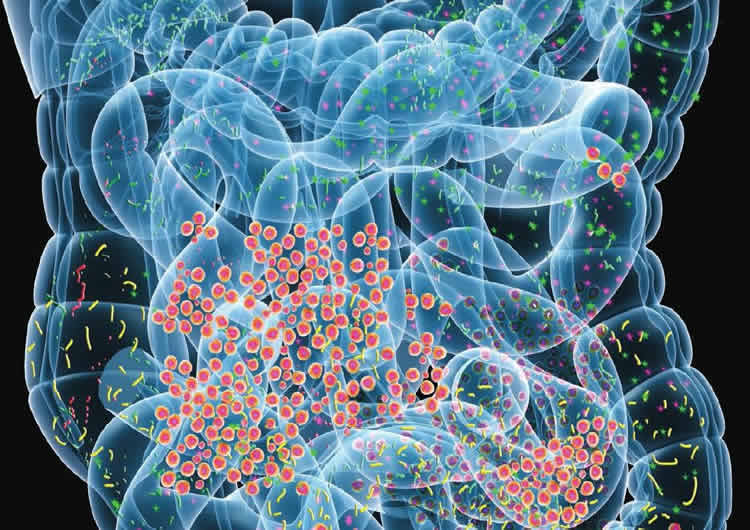Summary: According to researchers, probiotics can help relieve symptoms of depression, as well as be beneficial in helping to treat IBS.
Source: McMaster University.
Probiotics may relieve symptoms of depression, as well as help gastrointestinal upset, research from McMaster University has found.
In a study published in the medical journal Gastroenterology, researchers of the Farncombe Family Digestive Health Research Institute found that twice as many adults with irritable bowel syndrome (IBS) reported improvements from co-existing depression when they took a specific probiotic than adults with IBS who took a placebo.
The study provides further evidence of the microbiota environment in the intestines being in direct communication with the brain said senior author Dr. Premysl Bercik, an associate professor of medicine at McMaster and a gastroenterologist for Hamilton Health Sciences.
“This study shows that consumption of a specific probiotic can improve both gut symptoms and psychological issues in IBS. This opens new avenues not only for the treatment of patients with functional bowel disorders but also for patients with primary psychiatric diseases,” he said.
IBS is the most common gastrointestinal disorder in the world, and is highly prevalent in Canada. It affects the large intestine and patients suffer from abdominal pain and altered bowel habits like diarrhea and constipation. They are also frequently affected by chronic anxiety or depression.
The pilot study involved 44 adults with IBS and mild to moderate anxiety or depression. They were followed for 10 weeks, as half took a daily dose of the probiotic Bifidobacterium longum NCC3001, while the others had a placebo.
At six weeks, 14 of 22, or 64%, of the patients taking the probiotic had decreased depression scores, compared to seven of 22 (or 32%) of patients given placebo.

Functional Magnetic Resonance Imaging (fMRI) showed that the improvement in depression scores was associated with changes in multiple brain areas involved in mood control.
“This is the result of a decade long journey – from identifying the probiotic, testing it in preclinical models and investigating the pathways through which the signals from the gut reach the brain,” said Bercik.
“The results of this pilot study are very promising but they have to be confirmed in a future, larger scale trial,” said Dr. Maria Pinto Sanchez, the first author and a McMaster clinical research fellow.
Source: McMaster University
Image Source: NeuroscienceNews.com image is in the public domain.
Original Research: Abstract for “Probiotic Bifidobacterium longum NCC3001 Reduces Depression Scores and Alters Brain Activity: a Pilot Study in Patients With Irritable Bowel Syndrome” by Maria Ines Pinto-Sanchez, MD, Geoffrey B. Hall, PhD, Kathy Ghajar, BSc, Andrea Nardelli, MD, Carolina Bolino, MD, Jennifer T. Lau, BSc, Francois-Pierre Martin, PhD, Ornella Cominetti, PhD, Christopher Welsh, BSc, Amber Rieder, BA, Jenna Traynor, BSc, Caitlin Gregory, MD, Giada De Palma, PhD, Marc Pigrau, MD, Alexander C. Ford, MD, Joseph Macri, PhD, Bernard Berner, PhD, Gabriela Bergonzelli, PhD, Michael G. Surette, PhD, Stephen M. Collins, MD, Paul Moayyedi, MD, and Premysl Bercik, MD in Gastroenterology. Published online May 27 2017 doi:10.1053/j.gastro.2017.05.003
[cbtabs][cbtab title=”MLA”]McMaster University “Probiotics May Help Improve Symptoms of Depression.” NeuroscienceNews. NeuroscienceNews, 27 May 2017.
<https://neurosciencenews.com/probiotics-depression-6783/>.[/cbtab][cbtab title=”APA”]McMaster University (2017, May 27). Probiotics May Help Improve Symptoms of Depression. NeuroscienceNew. Retrieved May 27, 2017 from https://neurosciencenews.com/probiotics-depression-6783/[/cbtab][cbtab title=”Chicago”]McMaster University “Probiotics May Help Improve Symptoms of Depression.” https://neurosciencenews.com/probiotics-depression-6783/ (accessed May 27, 2017).[/cbtab][/cbtabs]
Abstract
Probiotic Bifidobacterium longum NCC3001 Reduces Depression Scores and Alters Brain Activity: a Pilot Study in Patients With Irritable Bowel Syndrome
Background & Aims
Probiotics can reduce symptoms of irritable bowel syndrome (IBS), but little is known about their effects on psychiatric comorbidities. We performed a prospective study to evaluate the effects of Bifidobacterium longum NCC3001 (BL) on anxiety and depression in patients with IBS.
Methods
We performed a randomized, double-blind, placebo-controlled study of 44 adults with IBS and diarrhea or a mixed-stool pattern (based on Rome III criteria) and mild to moderate anxiety and/or depression (based on the Hospital Anxiety and Depression scale) at McMaster University in Canada, from March 2011 to May 2014. At the screening visit, clinical history and symptoms were assessed and blood samples were collected. Patients were then randomly assigned to groups and given daily BL (n=22) or placebo (n=22) for 6 weeks. At week 0, 6 and 10, we determined patients’ levels of anxiety and depression, IBS symptoms, quality of life, and somatization using validated questionnaires. At week 0 and 6, stool, urine and blood samples were collected, and functional magnetic resonance imaging (fMRI) test was performed. We assessed brain activation patterns, fecal microbiota, urine metabolome profiles, serum markers of inflammation, neurotransmitters and neurotrophin levels.
Results
At week 6, 14/22 patients in the BL group had reduction in depression scores of 2 points or more on the Hospital Anxiety and Depression scale, vs 7/22 patients in the placebo group (P=.04). BL had no significant effect on anxiety or IBS symptoms. Patients in the BL group had a mean increase in quality of life score compared with the placebo group. The fMRI analysis showed that BL reduced responses to negative emotional stimuli in multiple brain areas, including amygdala and fronto–limbic regions, compared with placebo. The groups had similar fecal microbiota profiles, serum markers of inflammation, and levels of neurotrophins and neurotransmitters, but the BL group had reduced urine levels of methylamines and aromatic amino acids metabolites. At week 10, depression scores were reduced in patients given BL vs placebo.
Conclusion
In a placebo-controlled trial, we found that the probiotic BL reduces depression but not anxiety scores and increases quality of life in patients with IBS. These improvements were associated with changes in brain activation patterns that indicate that this probiotic reduces limbic reactivity. ClinicalTrials.gov no. NCT01276626.
“Probiotic Bifidobacterium longum NCC3001 Reduces Depression Scores and Alters Brain Activity: a Pilot Study in Patients With Irritable Bowel Syndrome” by Maria Ines Pinto-Sanchez, MD, Geoffrey B. Hall, PhD, Kathy Ghajar, BSc, Andrea Nardelli, MD, Carolina Bolino, MD, Jennifer T. Lau, BSc, Francois-Pierre Martin, PhD, Ornella Cominetti, PhD, Christopher Welsh, BSc, Amber Rieder, BA, Jenna Traynor, BSc, Caitlin Gregory, MD, Giada De Palma, PhD, Marc Pigrau, MD, Alexander C. Ford, MD, Joseph Macri, PhD, Bernard Berner, PhD, Gabriela Bergonzelli, PhD, Michael G. Surette, PhD, Stephen M. Collins, MD, Paul Moayyedi, MD, and Premysl Bercik, MD in Gastroenterology. Published online May 27 2017 doi:10.1053/j.gastro.2017.05.003






